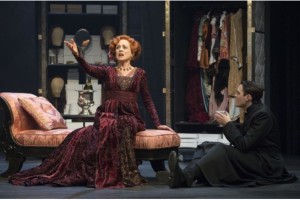Shaw Festival scores with Quebec playwright Bouchard’s conflicted The Divine

NIAGARA-ON-THE-LAKE, ONT. — There’s no denying that the Shaw Festival’s world premiere production of Michel Marc Bouchard’s The Divine: A Play For Sarah Bernhardt makes for exciting theatre.
It provides another stunning example of the strength of the festival’s celebrated acting company. And it offers a further vindication of artistic director Jackie Maxwell’s commitment to find new ways of bringing contemporary dramatists into the festival tent while also continuing to serve the festival’s central mandate of exploring the world of George Bernard Shaw and his contemporaries.
But while it’s possible to urge anyone who cares about quality theatre to seek out this piece, one also feels obliged to add a caveat of sorts. There is more than one play here struggling to emerge.
We’re in Quebec City at the turn of the last century, and it’s significant that the evening’s two most powerful moments have nothing to do with the title.
One comes when Wade Bogert-O’Brien, gripping in the role of a young but troubled seminarian, lays bare his inner conflicts when he starts talking about the sexual abuse he once suffered at the hands of an older priest.
The scene understandably conjures up images of the Roman Catholic Church’s more recent scandals, while also carrying the implication that these are by no means a new phenomenon. But they also evoke a particular era in Quebec history, an era when the Church was all powerful, yielding authority to no-one within the political, social and financial spheres. This was a time when the Church was so determined to control even the school system that it successfully blocked the Quebec government’s attempt to set up a department of education.
As theatrical historian Paul Lefebvre mentions in his excellent program notes, the Quebec clergy occupied an enviable place in the province’s hierarchy, enjoying the kind of entitlement which could lead to abuse. “Being a priest meant occupying the most prestigious social function, ahead of doctors, lawyers, politicians and business people…For all of these reasons, the farming and working-class families were ready to make enormous financial sacrifices if one of their children showed the intellectual and spiritual gifts required to enter the priesthood.”
So there is a terrible irony in this spectacle of a young seminarian from an impoverished background accepting that the only way he can get ahead in this society is to become part of the same order that — it is suggested — quietly looked the other way when he was abused.
A whole culture has defined itself within these few moments. But this is not the only explosive scene. We’re also taken to a dank, dark factory, the kind of festering place whose sweatshop brutality was tolerated by the church-dominated culture of the day. And it’s here that we encounter acts of psychological and physical brutality by the factory’s smooth talking, sanctimonious boss, portrayed with chilling conviction by Ric Reid. The scene adds further detail to this fine Quebec playwright’s religious and social tapestry.
But what’s the connection with Sarah Bernhardt? Ah, there’s the rub.
The very title of the piece suggests that it’s a play about the legendary French actress. Well, it is — but only peripherally. The promotion for The Divine indicates that it’s about her controversial visit to Quebec City in 1905 and the Church’s attempt to suppress her performances. Well, that’s true — but again, only peripherally.
Fiona Reid, who plays Bernhardt, doesn’t even appear until well into the play, and Bouchard has given her an abundance of witty lines that help define her character and underline her determination to buck the Church’s strictures by whatever wily means are necessary. Reid delivers the Bernhardt of Michel Marc Bouchard’s imagination, even though she occasionally seems challenged by the cadences of Linda Gaboriau’s English translation and also by the play’s inclination to see her in some scenes as a source of comic relief. But the big question is how successfully the play’s Bernhardt component connects with its more serious concerns. The answer: not that much, despite a fine actress’s stellar attempt to assert some linkage.
So what we’re left with is a succession of compelling scenes, directed with restraint and understanding by Jackie Maxwell — scenes that don’t entirely mesh.
On the other hand, every performance is to be applauded. Ben Sanders is both funny and touching as the star-struck young seminarian assigned to tell the Divine Sarah not to perform in Quebec City — even though his mission doesn’t seem dramatically convincing. Martin Happer occupies his own brilliant niche as an austere but compromising older cleric. And Mary Haney is absolutely heart-breaking as a worn and weary mother who has sacrificed all to see her son better himself by becoming a priest.
This production at the Royal George Theatre has been designed by Michael Gianfrancesco with an eye to the grey and the drab. Further atmosphere comes from the contributions of lighting designer Bonnie Beecher and John Gzowski. In brief, a compelling evening in the theatre, even though it doesn’t quite hang together. As for the title — yes, it is a bit of a cheat.
(The Divine continues to Oct. 11. Ticket information at 1 800 511 SHAW or shawfest.com)